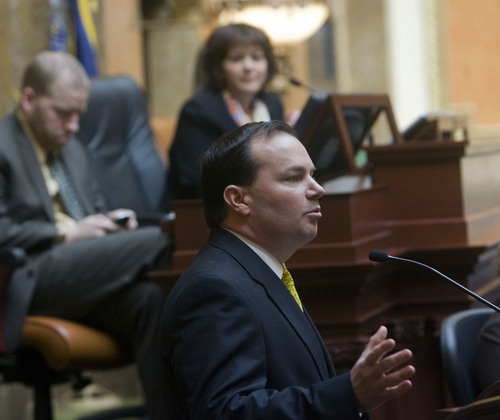This is an archived article that was published on sltrib.com in 2014, and information in the article may be outdated. It is provided only for personal research purposes and may not be reprinted.
Sen. Mike Lee, R-Utah, is known as a tea party ring leader behind last year's federal shutdown. But he called Friday for moving beyond Boston Tea Party-style protests to the hard work of creating a government that can best serve people, as the writers of the Constitution did in Philadelphia.
"We have to remember that frustration is not a platform, and anger is not an agenda," Lee said in a speech at the Hinckley Institute of Politics at the University of Utah. "In order to get the kind of government we do want, we have to identify what kind of government that is. As we do that, we will move forward from Boston to Philadelphia."
Lee, who has served three years as a senator, said better compromise and more bipartisanship are needed in Congress, noting its approval ratings are now between 6 and 9 percent. He joked that makes it "slightly less popular than Raul Castro and slightly more popular than the influenza virus."
He said he is being more bipartisan himself by joining Democrats to cosponsor legislation seeking to stop the government from spying on citizens; require due process for some citizens now held indefinitely because they are suspected of terrorism; and reform criminal sentencing that he says has increased prison populations tenfold since 1980.
"In any legislative body where there is more than one person involved, the question is not whether you will compromise. It is where and how, and just as importantly where you will not compromise," he said.
"As we march toward Philadelphia, there will be disagreements and there will be Boston-style moments ... [as members] speak out against their government doing things they don't like, for example spying on them," Lee said.
He said in that spirit, he will vote against and protest anything he feels violates the Constitution. Also, he said he tries hard to avoid worsening deficit spending — because it will force people too young to vote today to pay much of the debt incurred now. "That's a form of taxation without representation, and we fought a war and won that war" over that, he said.
Lee said he wants to work with others for reforms to erase traps that keep some in poverty, avoid taxes and regulation costs that rob the middle class of any income increases they see, and eliminate some unfairness that helps the rich get richer.
Toward that, he said is pushing bills that include proposing to cut the federal gasoline tax to let the states impose it instead and avoid expensive federal regulations and skimming; allowing states to accredit innovative and cheaper forms of higher education; removing federal barriers to flexible work schedules; and increasing tax credits for raising children.
He said that would create more Philadelphia-style building of a system to help people.
"As that happens, we as a society will benefit. If we do it right, we will enhance and improve and preserve for future generations the economic opportunities in society we have here in the United States," he said.
Kirk Jowers, director of the Hinckley Institute, said that since the federal shutdown, Lee has "had a very consistent message of trying to move Republicans and more specifically tea partiers away from protest and anger and toward a more productive approach to government and having a real agenda."
He said that is something Lee likely needs to do to survive politically in Utah, although it runs some risk with more extreme tea party members. "I am an optimist that he realizes how broken D.C. is, and he has to be part of the solution," Jowers said.
He said the speech played well with 40 students in a class he teaches who attended the talk. He said more than half said they had a negative opinion of him before the speech, and all but one said their opinion of him improved after it. "But there's still a trust-but-verify sort of feeling among them," he said.



